Globalisation:Media Smart:Activities
- Digital Adwise official website : http://digitaladwise.mediasmart.org.uk
Media Smart recently launched a new set of independently drawn up teaching materials (Be Adwise 2), which aim to build up children’s literacy skills with regard to the digital media, which are of growing importance in their lives. The programme has received extensive government and stakeholder support and is being requested by a large number of schools in the UK. [1]
This initiative has been launched at a time when 77% of children use the internet regularly and it involves free online lessons. [2] These lessons allow children to learn about digital advertising in a fun, engaging manner. It teaches them to think critically about advertising online as they are an easy target for marketers. Advertising to children is now a £99 billion industry, so it is important that they are aware of it and know how to deal with it.[3]
Digital Adwise is funded by many brands and companies, some of which being Mars, Kellogs, McDonalds, Ferrero, Lego, Mattell and Hasbro. It is also supported by the wider advertising industry, including the Institute of Practitioners in Advertising (IPA).[4]
Teachers are able to log into the Digital Adwise website where they can download various resources for the lesson’s including activity sheets, lesson plans and digital adverts. [5] The resource centre provides notes which are suitable to be used with teacher power points, whiteboard activity screens, online activities for pupils and printable worksheets on their main website. The teacher’s notes provide a guide on different approaches that can be taken to teaching the activities to the pupils. The activities available are designed to appeal to a variety of different learning styles – i.e. visual, auditory, interpersonal, etc – and are broken down into manageable tasks that can be carried out as discrete activities, or combined into one lesson, with introductory and plenary sessions.[6]
Activities
- TAG THE ADVERTISEMENT- 45 adverts appear when walking down a virtual street the player has to click on every advertisement they notice. Including in shop window displays, the sides of lorries and on televisions evoking how many we bypass each day without much consideration.
- ADVERTING CHALLENGE – Linking individuals to certain brands, showing celebrity culture sells brands. Media Smarts feature Bill Board, Maggie Zeen and Ray deo linking their favourite pastimes to the object that it requires
- MAKE YOUR OWN BRAND- Making an interactive version of yourself or others the player creates their own clothes logo and slogan to appear on their interactive self featuring on a television advert, action figure or t-shirt. [7]

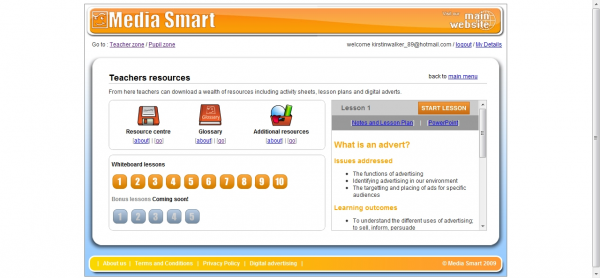
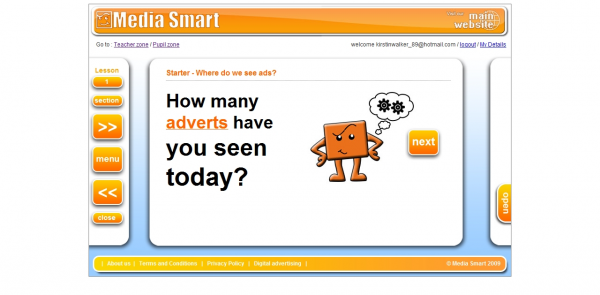
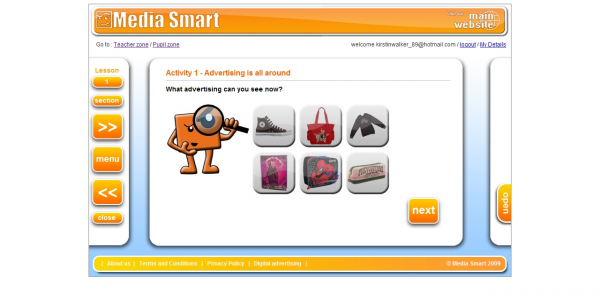
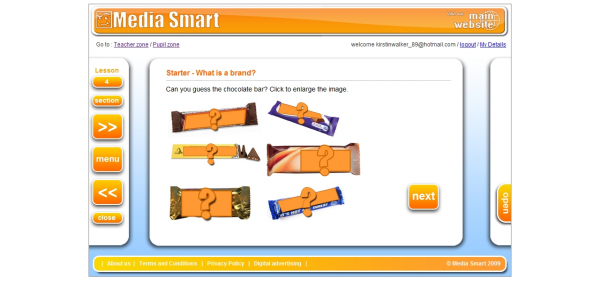
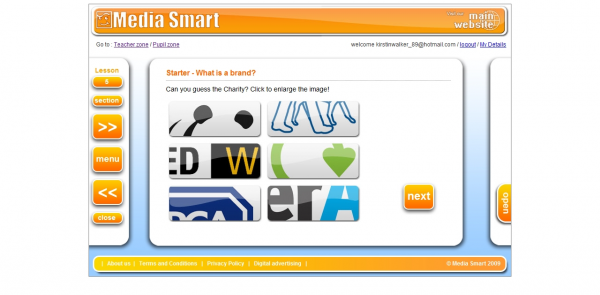
Responses to the digital adwise campaign
Positive remarks on Media Smarts adwise campaign have been consistently published throughout both the academic and media world some of these responses include:
- “Children develop a critical attitude to advertising at an early stage. Instead of further regulations children should be taught to become more critical consumers and use ads more constructively.” [14] showing that Media smarts programme have the best intensions for primary school aged children.
- “Comprehension of narrative content was high, even among the youngest children; correct articulation of message intent occurred primarily among older children; evidence indicates that young children may interpret messages in informational terms regardless of message intent.” [15]
evoking that the research has paid off and the experts have found a comprehensive way of teaching the children in a fun and interesting manner.
- A government statement from The House of Commons clearly states the governments push for this project to keep going and develop further. ‘That this House notes that, given the increased exposure to and use of digital media platforms by children, media literacy is an increasingly important skill for children to have and as such an important part of primary school education; therefore calls for materials such as Media Smart's Digital Adwise programme to be taken up by primary schools to increase children's awareness of advertising material online and their ability to think critically when viewing commercial communications; further calls for the Government to help expedite this by aiming to encourage more primary schools to adopt Media Smart or similar education schemes by 2012; further calls for the Government to take advice from education experts and groups on the introduction of media literacy teaching more widely across primary schools; and further calls for the Government to explore the possibility of incorporating media literacy teaching such as the Media Smart lessons and similar programmes into the primary school curriculum. ’[16]
There have also been a number of more negative press announcements including
- ‘Despite the good intentions of the programme, it is ironic that such educational material be funded by the likes of Mars and McDonald’s, whose direct advertising to children has done so much to contribute to child obesity. Hypocrisy? Perhaps it would be kindest to believe that said companies are making amends for past mistakes.’ [17]
- Livingstone 2006 also argues that ‘advertising literacy is an insufficient cognitive defence against the effects of advertising. Whilst this may be Livingstone’s view, she is isolated in the academic community in this position and her views differ from those of significant figures in the media and media education’ [18] her full research report can be found at : Livingston
- ‘McDonald's has signed a controversial deal to sponsor the ITV weekend children's programming strand, prompting one Labour MP to call for fast-food TV tie-ups to be banned. McDonald's is spending an estimated £1m to back GMTV kids' programming strand 'Diggit', which covers all ITV's weekend programming from 7.10am to 9.25am. The core audience is three-to eight-year-olds. McDonald's' ad agency Leo Burnett is creating sponsorship idents that combine cartoon characters the Happy Hyenas with the McDonald's logo.’[19]
- ‘Separately, Media Smart, the industry-wide initiative to educate young people about the use of ads, is delaying its launch by four months. Kellogg, Mattel, Hasbro and Masterfoods are the only advertisers to sign up to date’ Showing that a number of businesses had to be pushed or persuaded to join the organisation [20]
Notes
- ↑ Responsible Advertising, Accessed on 02/11/10
- ↑ Improving Children's Understanding of Online Advertising, IPA, Accessed 11/11/10
- ↑ An Industry to Teach Kids to be More Marketing Aware Online, UTalk Marketing, Accessed 11/11/10
- ↑ Improving Children's Understanding of Online Advertising, IPA, Accessed 11/11/10
- ↑ Teachers, Accessed 11/11/10
- ↑ Resource Centre, Accessed 11/11/10
- ↑ Brand Me, Accessed 20/10/2010
- ↑ Image 1 Accessed 16/11/2010
- ↑ Image 2, Accessed 16/11/2010
- ↑ Image 3, Accessed 16/11/2010
- ↑ Image 4, Accessed 16/11/2010
- ↑ Image 5 Accessed 16/11/2010
- ↑ Image 6, Accessed 16/11/2010
- ↑ Flemming and Martensen, Children's Knowledge and Interpretation of Commercial Advertising Intentions,Truthfulness and Viewing Habits, Copenhagen Business School, Denmark 2001, Accessed 11/11/2010
- ↑ Blosser, Age-Differences in Children’s Perceptions of Message Intent Responses to TV-News,Commercials, Educational Spots, and Public-Service Announcements, Communication Research 1985, Accessed 11/11/2010
- ↑ House of Commons speaker, Accessed 11/11/2010
- ↑ Scott Tickner McDonald’s and Mars Preach Online Advertising Awareness to Kids on 24/11 /2009, Online Advertising , Accessed 11/11/10
- ↑ Media smart research, Accessed 11/11/2010
- ↑ Mark Kleinman,McDonald's under fire for kids, TV tie-up:An Industry to Teach Kids to be More Marketing Aware Online, UTalk Marketing 26/6/2002, Accessed 11/11/10
- ↑ Media Smart News, Accessed 11/11/2010
Back to Globalisation:Media Smart